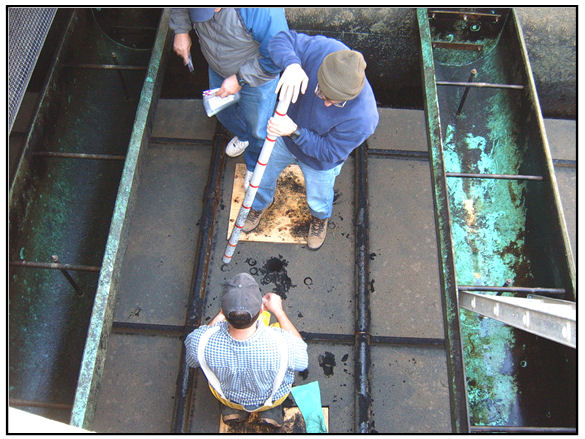Consulting Services
Filter Surveillance
Reliable filter performance is critical to meeting water quality standards. Performing a filter surveillance on a periodic basis will enable operational staff to identify problems before they become serious. It also ensures long filter media life and consistent production of high quality finished water. A filter surveillance is a comprehensive evaluation of the physical condition of the filter and its media as well as its operation and performance. A filter surveillance conducted by Schott Engineering Associates (SEA) on either gravity or pressure filters includes:
• Assessment of filter media condition
• Evaluating backwash system effectiveness
• Measuring filter bed expansion
• Analyzing backwash water turbidity
• Performing a floc retention analysis
• Recommending ways to improve filter performance
• Training operators to conduct a filter surveillance
Comprehensive Performance Evaluation (CPE)
SEA performs comprehensive evaluation of all aspects of water system operation and management and all major unit processes to identify factors that impact a treatment plant's ability to produce optimal quality water. Elements of a CPE performed by SEA include:
• Evaluation of water system operation and management
• Evaluation of major unit processes
• Identification and prioritization of performance limiting factors
• Preparation of a corrective action plan to improve performance of the existing treatment facilities
SEA staff has over 30 years of experience conducting comprehensive evaluations of public water systems.
Regulatory Compliance Evaluations
Staying in compliance with complex new laws and regulations can be difficult. A regulatory compliance evaluation provides a public water system a plan to achieve and maintain compliance. SEA can provide a comprehensive performance evaluation for a specific rule or give the status of compliance with all existing and proposed rules. The evaluation will identify all operational and facility deficiencies that make it difficult to achieve or maintain compliance and include a comprehensive plan with specific tasks and milestones. SEA will also provide assistance and advice in implementing the compliance plan.
Corrosion Control Evaluation
The Lead & Copper Rule requires public water systems to apply corrosion control treatment to finished water if either the lead or copper action level is exceeded. A corrosion control evaluation by SEA provides utilities with the information needed to select the most cost-effective corrosion control treatment. SEA uses its own state-of-the-art corrosion control application, Water!Pro, which is used by regulatory agencies, water utilities, and consulting engineers nationally and internationally.
Tracer Studies
By maximizing available contact time, a public water system can minimize its chlorine disinfection dosage, reduce chemical costs, and provide greater flexibility in meeting the disinfection inactivation requirements of the Surface Water Treatment Rule. A tracer study conducted by SEA, by either the pulse or step input methods, uses safe, conservative tracer materials and achieves a high rate of tracer recovery (>90%) to ensure valid results. The results of a well designed and executed tracer study performed by SEA will give a public water system a technically defensible short-circuiting factor as well as recommendations for increasing contact time if necessary.
Operator Training
Operators who understand the regulatory requirements are better able to make the right decision to keep a treatment plant in compliance with current and proposed drinking water rules and regulations. SEA training programs are designed to make complex regulatory requirements relevant to the day-to-day job that water treatment operators must perform. Training programs can be tailored to a specific public water system and/or treatment facility.

